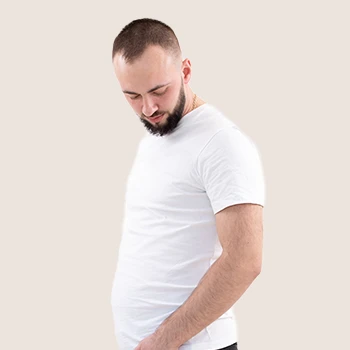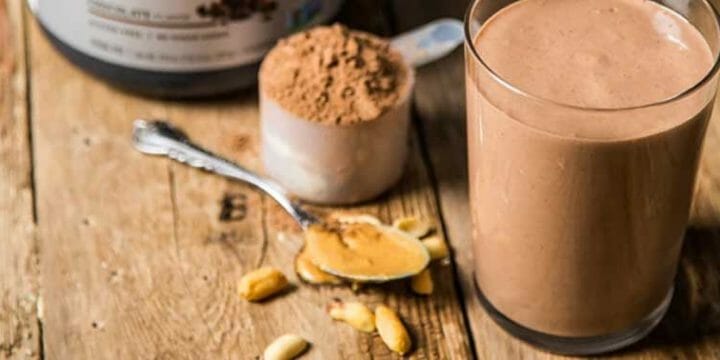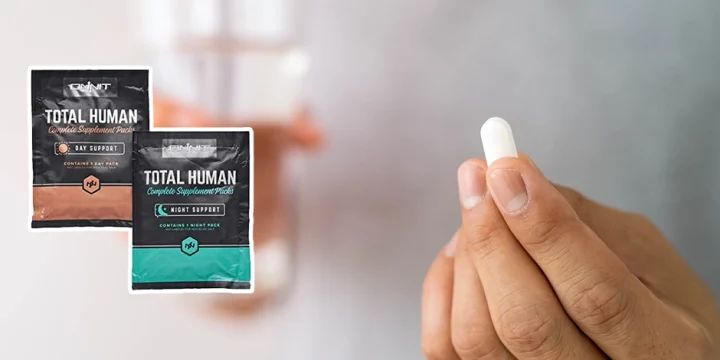When the scale goes the wrong way, many of my male clients come to me asking if their low testosterone could be the culprit.
I know from my own experience that there’s an intimate relationship between testosterone and weight gain, but I decided to tackle the science behind this question as well by reading several medical studies and discussing the literature with an endocrinologist.
Let’s take a look.
Quick Summary
- Low testosterone levels are linked to weight gain and difficulty in shedding calories.
- Testosterone affects metabolism, muscle mass, and fat distribution, influencing overall body weight.
- Early intervention with testosterone replacement therapy benefits men with metabolic syndrome or type-2 diabetes.
- For me personally, maintaining balanced testosterone levels is crucial for overall health and effective weight management.
Is There a Connection Between Weight and Testosterone?

Studies confirm a direct link between low testosterone and increased body fat. Testosterone, crucial for more than just sexual function, affects weight significantly. Hypogonadism, or low testosterone levels, plays a key role in this.
Let’s take a closer look at how they are connected.
Metabolism
Low testosterone is closely linked to metabolic syndrome, a condition marked by abdominal obesity, high blood pressure, and insulin resistance, elevating the risk of heart disease and type-2 diabetes, according to the Therapeutic Advances in Cardiovascular Disease [1].
I've observed in my clients that those with lower testosterone often have slower metabolisms, making weight management more challenging.
Early intervention with testosterone replacement therapy benefits hypogonadal men with metabolic syndrome, type-2 diabetes, or both [2].
Additionally, as testosterone levels decline, so does the amount of muscle mass, which we discuss next, resulting in a slowdown of metabolism.
Bottom line: higher testosterone levels equate to better metabolism.
Muscle

Testosterone is crucial for muscle mass development. Low levels lead to muscle loss, as testosterone binds with receptors in muscles to maintain them. Without enough testosterone, muscle maintenance ceases, causing degradation, according to the Clinical Biochemist Reviews [3].
From my training sessions, I've noticed clients with low testosterone have a harder time building and maintaining muscle mass.
Interestingly, a 2015 review shows that though mass is affected, muscle function and strength may not diminish [4].
Bottom line: you need to increase testosterone to lose body fat and increase muscle mass.
Related Article: Can You Build Muscle with Low Testosterone?
Fat
Fat cells contain an enzyme called aromatase that converts testosterone to estradiol (estrogen).
This conversion and increase in estrogen levels signal the endocrine system to slow testosterone production, according to the study published in PubMed [5].
In my experience, clients with higher body fat often struggle with lower testosterone levels, impacting their overall health.
Hormone replacement therapy can effectively improve the body composition of hypogonadal men by increasing serum testosterone levels [6].
A connection exists between testosterone and weight loss. Low T equals more body fat, and obesity lowers testosterone production, so men can find themselves in a vicious cycle when it comes to losing weight and gaining lean body mass.
Bottom line: health concerns with increased body fat are aplenty, from heart disease, high blood pressure, carrying extra weight on your joints, inhibiting the body’s ability to maintain a normal testosterone level, and affecting other hormones like estrogen.
“Testosterone also plays common roles for both sexes. For example, the hormone stimulates the body to make new red blood cells. Testosterone can also affect a man’s bone density, fat distribution, and muscle strength.”
-Rachel Nall, MSN
Cortisol Levels

According to the SageJournals, stress, particularly long-term stress, can increase cortisol levels and result in a reduction of T levels. Essentially creating an inverse relationship; as one rises, the other decreases [7].
Increased cortisol levels lower testosterone, which can lead to weight gain; it can also increase food intake and fat tissue, particularly belly fat [8].
I've seen many clients where chronic stress led to increased cortisol and decreased testosterone, affecting their weight and health.
Belly fat can increase because cortisol is released in response to stress, raising blood sugar levels, and this increase encourages fat storage, especially around the abdomen, according to the Cleveland Clinic [9].
Bottom line: high testosterone levels mean low cortisol levels, but higher than normal levels of cortisol can lead to stress-eating and low T, ultimately causing your body to store fat and promote weight gain.
Energy and Stamina
Low testosterone can significantly impact energy levels and stamina, and this is where many of my clients feel the biggest frustration and hurdle to their weight loss goals.
Researchers surveyed men who were taking prescription testosterone, and they reported an improvement in overall health [10].
They were taking it for:
- Low T (37.1%),
- Well-being (35.2%),
- Energy (28.7),
- Sex drive (21.9), and
- Social energy (19.4%)
The men surveyed report:
- Increased energy (52.3%)
- Increased libido (41.9%)
- Increased muscle (28.5%)
I tell my clients to think of testosterone as the fuel for energy, muscle gain, libido, physical appearance, and good overall health, so maintaining healthy levels of this key hormone is critical.
Bottom line: if you feel tired even after getting enough rest, low T could be the culprit, and you will likely experience diminished interest in working out, which can put you at greater risk of weight gain.
Can Exercise Help T levels?

Exercise can help T levels, and it’s probably the best testosterone treatment out there, along with natural testosterone boosters. Through regular exercise routines, I've helped numerous clients boost their testosterone levels naturally.
Like many of my clients, you may want to find natural ways to increase your testosterone without resorting to hormone replacement therapy, and exercise is a proven way to do that [11].
In my experience as a coach, testosterone-boosting workouts coupled with natural testosterone boosters consistently yields significant results for my clients.
Additional studies published in Journal of Clinical Biochemistry and Nutrition show that exercise significantly increases testosterone levels in obese men more than simply losing weight [12].
A year-long study of men who did not previously exercise showed increased dihydrotestosterone (DHT) levels of almost 15 percent when they began exercising [13].
In my research, I found countless studies supporting exercise and increased testosterone. Some studies support moderate exercise with testosterone therapy producing significant weight loss in men with lower testosterone levels [14].
Bottom line: exercise with or without hormone therapy can positively impact T levels. In addition, a targeted dietary approach, rich in specific nutrients, plays a crucial role in managing testosterone levels and weight, with certain foods having the potential to naturally boost testosterone and aid in effective weight management.
Symptoms of Low Testosterone

Testosterone plays a huge role in the male body, and as such, signs of low testosterone are vast and affect many bodily functions, including weight gain, depression, and lean muscle loss, according to the Cleveland Clinic [15].
Beyond the physical realm, low testosterone levels can profoundly impact mental health, leading to decreased self-esteem and a diminished quality of life, underscoring the importance of addressing both the physical and psychological aspects of this condition.
Here’s a list of the common symptoms of low testosterone:
- Weight gain
- Low energy
- Reduced sex drive
- Erectile dysfunction
- Loss of body hair
- Shrinking testicles
- Hot flashes
- Low sperm count
- Infertility
- Depressed mood
- Decreased mental clarity (concentration and memory)
- Chronic fatigue
- Increased body fat
- Enlarged breast tissue
- Decreased muscle mass
- Decreased endurance and stamina
Related Article: What Are the Causes of Low Testosterone?
Causes of Dropping Testosterone Levels
Several factors can cause hypogonadism (low T). However, we can distinguish two classifications of hypogonadism, primary and secondary.
Primary Hypogonadism
Underactive testes cause primary hypogonadism. This lack of activity may be due to a hereditary characteristic, injury, or disease [16].
Among the inherited conditions are:
- Undescended testicles: Testicles do not descend from the abdomen before birth.
- Klinefelter's syndrome: A disorder in which a male is born with three chromosomes: X, X, and Y [17].
- Hemochromatosis: A condition that causes too much iron in the blood, resulting in testicular dysfunction or pituitary injury [18].
Other causes of primary hypogonadism include a physical testicular injury, inflammation of the testicles, cancer therapy, and in some cases, testosterone replacement therapy.
Secondary Hypogonadism
Secondary hypogonadism is caused by damage to the hypothalamus or pituitary gland. These areas of the brain regulate testicular hormone production. However, the damage can occur either through acquired or disease-related factors.
The acquired factors that lead to secondary hypogonadism include:
- Medications: Opioids and steroids can impair the pituitary gland and hypothalamic function.
- Concurrent disease: Severe mental or physical stress following an illness or surgery might temporarily cause the reproductive organs to shut down.
- Normal aging: Aging influences hormone production and responsiveness.
- Obesity: Excess body fat can also interfere with hormone synthesis and reaction.
Additionally, low testosterone may occur due to inherited or disease factors, such as drug-induced pituitary problems, renal failure, inflammatory diseases, HIV/AIDs, or Kallmann syndrome [19].
FAQs
Is It Hard to Lose Weight With Low Testosterone?
It is harder to lose weight with low testosterone. Studies link below-normal testosterone levels to weight gain and higher body fat percentage. Additionally, obesity can lower total testosterone causing a cycle making losing and maintaining a healthy weight difficult [16].
Does Testosterone Affect Waist Size?
Testosterone affects waist size, and several studies link low testosterone to increased waist size and consider increased abdominal fatty tissue a good predictor of low testosterone [17].
Does Low Testosterone Affect Metabolism?
Low testosterone can affect metabolism because as your hormone levels decline, you lose muscle mass, which, in turn, causes your metabolism to slow down and usually causes you to gain fat which ultimately makes weight loss difficult.
Can Low Testosterone Cause Belly Fat?
Yes, low testosterone can cause belly fat as fat cells contain an enzyme called aromatase that converts testosterone into estrogen leading to testosterone deficiency. The hormonal imbalance, in turn, leads to more belly fat.
References:
- https://www.ncbi.nlm.nih.gov/pmc/articles/PMC5933580/#:
- https://www.ncbi.nlm.nih.gov/pmc/articles/PMC3474619/
- https://www.ncbi.nlm.nih.gov/pmc/articles/PMC4810760/
- https://www.ncbi.nlm.nih.gov/pmc/articles/PMC5031462/
- https://pubmed.ncbi.nlm.nih.gov/11399122/
- https://www.ncbi.nlm.nih.gov/pmc/articles/PMC3296126/
- https://journals.sagepub.com/doi/full/10.1177/02601060221083079
- https://onlinelibrary.wiley.com/doi/10.1002/oby.21790
- https://my.clevelandclinic.org/health/articles/22187-cortisol
- https://www.ncbi.nlm.nih.gov/pmc/articles/PMC6765788/
- https://pubmed.ncbi.nlm.nih.gov/22234399/
- https://www.ncbi.nlm.nih.gov/pmc/articles/PMC4706091/
- https://www.ncbi.nlm.nih.gov/pmc/articles/PMC3040039/
- https://www.ncbi.nlm.nih.gov/pmc/articles/PMC4154787/
- https://my.clevelandclinic.org/health/diseases/15603-low-testosterone-male-hypogonadism
- https://pubmed.ncbi.nlm.nih.gov/24119423/
- https://www.webmd.com/men/klinefelter-syndrome
- https://pubmed.ncbi.nlm.nih.gov/28613612/
- https://pubmed.ncbi.nlm.nih.gov/30855798/
About The Author
You May Also Like






